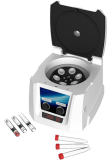
Centrifuges for clinical applications
Centrifuges are essential tools in clinical applications, serving a variety of functions that enhance diagnostic and research capabilities. Here are some key applications:
- Blood Component Separation: Centrifuges are crucial for separating blood into its components, such as red blood cells, white blood cells, plasma, and serum. This process is vital for numerous diagnostic tests, including blood chemistry analysis and hematocrit measurements.
- Clinical Diagnostics: They facilitate the preparation of samples for various diagnostic tests, enabling accurate analysis of biological fluids like blood and urine. This includes cell counting and coagulation studies.
- Microbiology: In microbiology labs, centrifuges are used to separate microorganisms from culture media, concentrate samples for testing, and purify compounds such as vaccines and antibodies.
- Cell Biology: Centrifuges help isolate specific cell types from heterogeneous samples in cell culture applications. They are also used in tissue engineering to prepare and concentrate cells.
- Molecular Biology: They play an important role in processing biological samples for DNA, RNA, and protein purification. This is essential in techniques such as polymerase chain reaction (PCR) and DNA sequencing.
- Biochemistry and Proteomics: Centrifuges facilitate the isolation and purification of proteins and subcellular fractions, which are crucial for biochemical analyses and research.
- Regenerative Therapy: Clinical centrifuges are employed in regenerative medicine to concentrate stem cells or other therapeutic agents from patient samples for personalized treatment solutions.
These applications demonstrate the versatility and importance of centrifuges in enhancing clinical diagnostics, research, and therapeutic processes across various medical fields
Search result : 2 product found
Refine your search :
RUOCE / IVD
- Equipment
Cat#
Description
Cond.
Price Bef. VAT
‹
›

